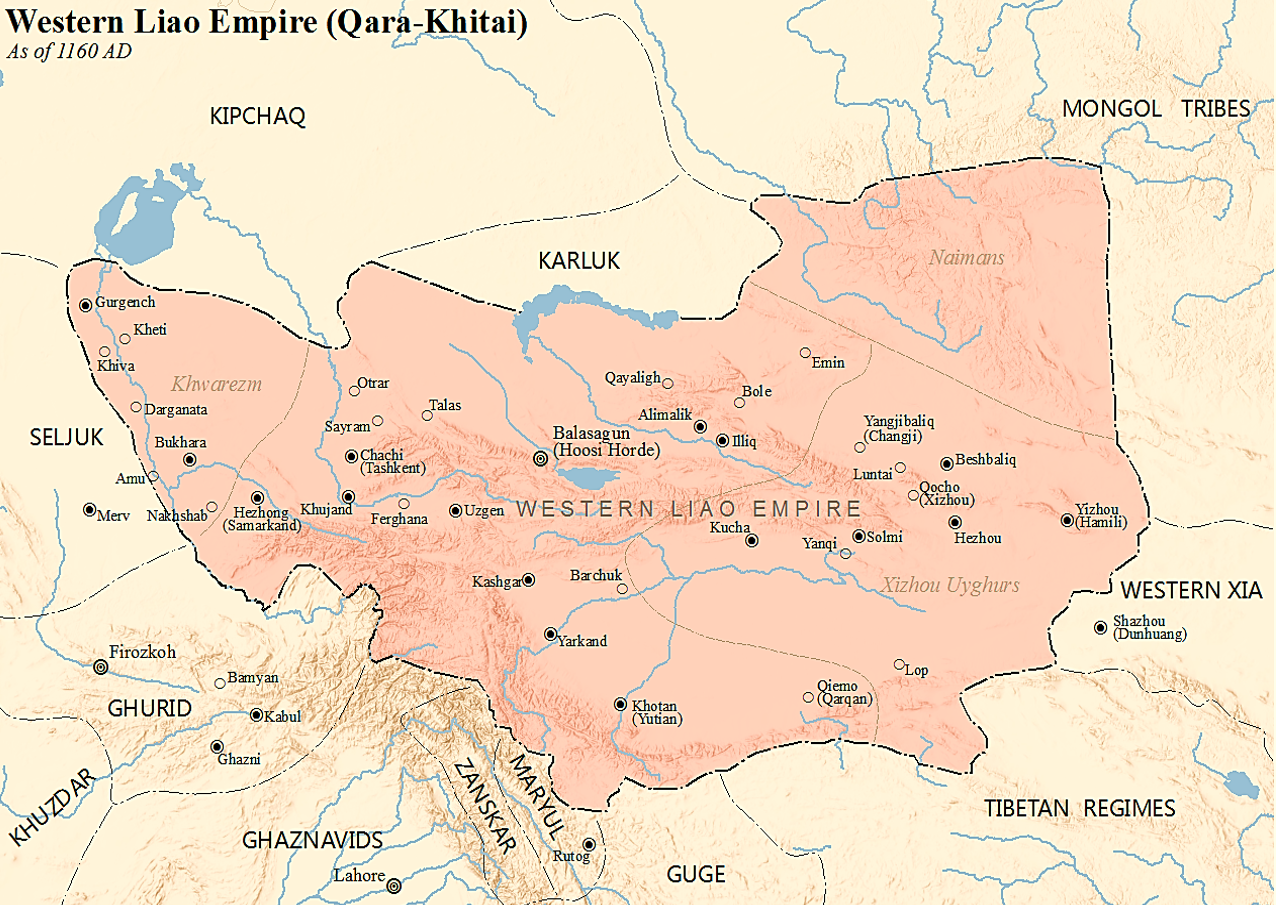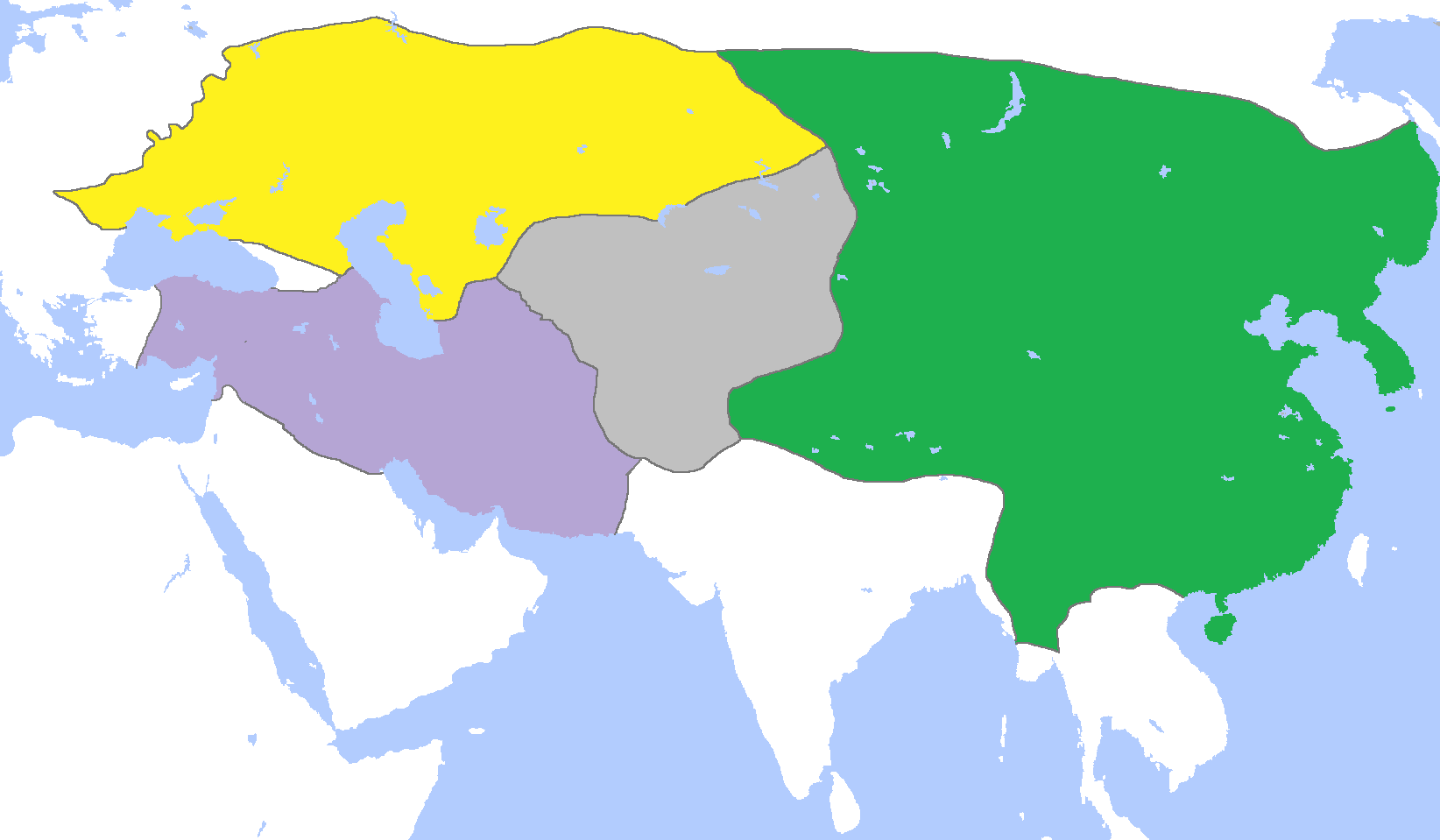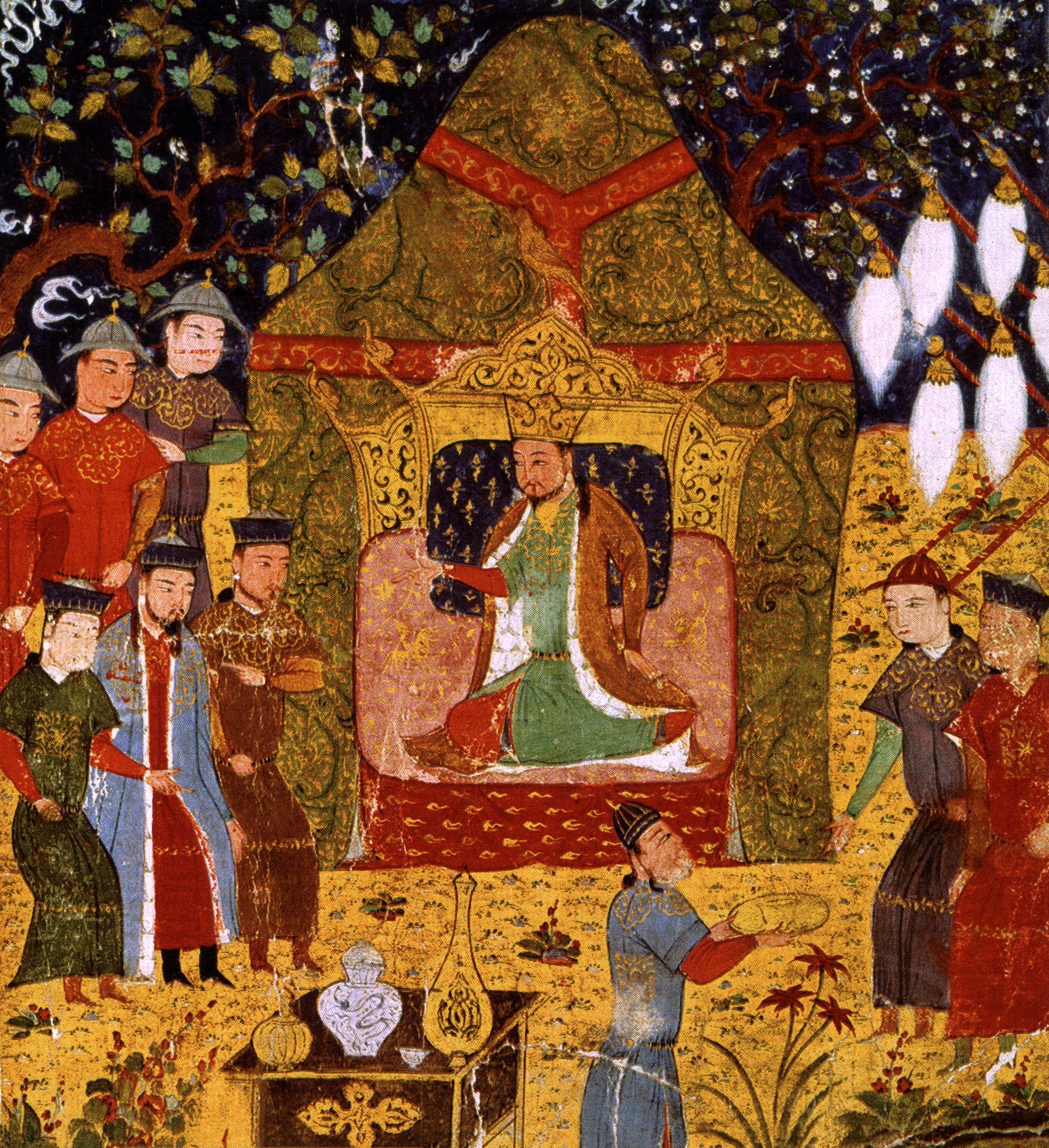|
Qutuqtu
Qutuqtu (, ) was the second son of Tolui and Lingqun Khatun (daughter of Kuchlug). He was the grandson of Genghis Khan. Although he took part in Ogedei Khan's invasion of Song, Qutuqtu was killed in battle against the Song general Meng Yu (孟珙). Family Although Qutuqtu left no male descendants, he had a daughter, Kelmish Agha, who was instrumental in cementing the Yuan-Golden Horde alliance. Kelmish, married to Saljidai Gurkhan, gave birth to a daughter, Oljai Khatun. Oljai married Mengu-Timur (a descendant of Jochi) and gave birth to Toqta Khan of the Golden Horde. Qutuqtu's full-sister, Ile Temür, married Pars Buqa, grandson of Quduka Beki of the Oirat tribe. Ancestry {{ahnentafel , collapsed=yes , align=center , boxstyle_1=background-color: #fcc; , boxstyle_2=background-color: #fb9; , boxstyle_3=background-color: #ffc; , boxstyle_4=background-color: #bfc; , boxstyle_5=background-color: #9fe; , 1= 1. Qutuqtu , 2= 2. Tolui , 3= 3. Lingqun Khatun , 4= 4. Genghis Khan , 5 ... [...More Info...] [...Related Items...] OR: [Wikipedia] [Google] [Baidu] |
Tolui
Tolui (also Toluy, Tului; , meaning: "the mirror"; – 1232) was a Mongol khan, the fourth son of Genghis Khan by his chief khatun, Börte. At his father's death in 1227, his ''Orda (organization), ulus'', or territorial inheritance, was the Mongol homelands on the Mongolian Plateau, and he also served as civil administrator until 1229, the time it took to confirm Ögedei Khan, Ögedei as the second Khagan, Great Khan of the Mongol Empire (1206–1368). Before that, he had served with distinction in the campaigns against the Jin dynasty (1115–1234), Jin dynasty, the Mongol conquest of Western Xia, Western Xia and the Khwarezmid Empire, where he was instrumental in the capture and massacre at Merv and Nishapur. He is a direct ancestor of most of the Ilkhanids. Tolui never used the title of Khagan himself; neither Genghis Khan nor his immediate three successors would ever use any Chinese era name, era names unlike the neighboring Zhongyuan, Central Plain dynasties in the south ... [...More Info...] [...Related Items...] OR: [Wikipedia] [Google] [Baidu] |
Mengu-Timur
Munkh Tumur or Möngke Temür ( mn, ᠮᠦᠨᠺᠬᠲᠡᠮᠦᠷ, Мөнхтөмөр; russian: Мангутемир, Mangutemir) (?–1280), son of Toqoqan Khan and Köchu Khatun of Oirat (daughter of Toralchi Küregen and granddaughter of Qutuqa Beki) and the grandson of Batu Khan. He was a khan of the Golden Horde, a division of the Mongol Empire in 1266–1280. His name literally means "Eternal Iron" in the Mongolian language. Early reign and foreign policy During his reign, the Mongols together with their subjects, several Turkic tribes and the Russian princes, undertook military campaigns against Byzantium (c. 1269–1271), Lithuania (1275), and Alans in Caucasus (1277). The very first yarlyk (license) found by historians was written on behalf of Mengu-Timur and contained information on the release of the Russian Orthodox Church from paying tribute to the Golden Horde, however, he was a shamanist. During the reign of Mengu-Timur, the Genoese traders purchased Caffa f ... [...More Info...] [...Related Items...] OR: [Wikipedia] [Google] [Baidu] |
Yelü Zhilugu
Yelü Zhilugu () was the third emperor of the Western Liao dynasty, ruling from 1177 to 1211. As the final ruler from the House of Yelü, he is considered by traditional Chinese sources to be the last monarch of the Western Liao dynasty. Reign He was Yelü Yilie's second son,''History of Liao''vol 30/ref> after Xiao Wolila (萧斡里剌) killed his aunt Yelü Pusuwan in coup, Zhilugu killed his elder brother too. According to Juvaini, "he was sacrificed in order to secure new sovereign". Involvement in Khwarazm continued under his reign. Xiao Duolubu (蕭朵魯不) assisted Sultan Shah with his seizing of Merv and Sarakhs. In turn Tekish's new son-in-law, Kipchak leader Qara Ozan invaded Talas in 1181. However, around the 1190s, after Sultan Shah's death, Tekish again submitted to Qara Khitai and began sending tributes. He met with fugitive Kereit prince Toghrul in 1195, who probably asked for military help with no success. War with Ghurids In 1198, Kara Khitai and K ... [...More Info...] [...Related Items...] OR: [Wikipedia] [Google] [Baidu] |
Kuchlug
Kuchlug (also spelled ''Küchlüg'', ''Küçlüg'', ''Güčülüg'', ''Quqluq'') ( mn, Хүчлүг; ; d. 1218) was a member of the Naiman tribe who became the last ruler of the Western Liao dynasty (Qara Khitai). The Naimans were defeated by Genghis Khan and he fled westward to the Qara Khitai, where he became an advisor to his future father-in-law Yelü Zhilugu. He later rebelled, usurped the throne and took control of the empire, putting an end to the rule of the House of Yelü. He was killed in 1218 by the Mongols and the domain of the Qara Khitai was absorbed into the Mongol Empire. While his predecessor Yelü Zhilugu was the last Qara Khitai emperor from the Yelü clan, Kuchlug is sometimes regarded as the final ruler of the Western Liao realm as he retained the dynastic title of "Great Liao" upon his ascension to the throne. Naiman origins and westward flight Kuchlug was the son of Taibuqa, the Tayang khan (leader) of the Naimans, a Mongol-speaking tribe. In 1204, Jamuq ... [...More Info...] [...Related Items...] OR: [Wikipedia] [Google] [Baidu] |
Toqta
Tokhta (Toqta, Toktu, Tokhtai, Tochtu or Tokhtogha) (died ) was a khan of the Golden Horde, son of Mengu-Timur and great-grandson of Batu Khan. His name "Tokhtokh" means "hold/holding" in the Mongolian language. Early reign under Nogai In 1288, Tokhta was ousted by his cousins. In 1291, he reclaimed the throne with the help of Nogai Khan. Tokhta then gave the Crimea to Nogai as a gift. Nogai subsequently beheaded many of the Mongol nobles who were supporters of Tulabuga, thanks to his new supposed puppet khan. Tokhta wanted to eliminate the Russian princes' semi-independence. To that effect, he had sent his brother Tudan to the Rus lands in 1293. Tudan's army would go on to devastate fourteen towns. Tokhta himself (known here as Tokhta-Temur) went to Tver, and forced Dmitry Alexandrovich, Nogai's ally, to abdicate. The Russians chroniclers depicted these events as "The harsh-time of Batu returns." Some sources have suggested that Tokhta and Nogai had worked together. So ... [...More Info...] [...Related Items...] OR: [Wikipedia] [Google] [Baidu] |
Yuan Dynasty
The Yuan dynasty (), officially the Great Yuan (; xng, , , literally "Great Yuan State"), was a Mongol-led imperial dynasty of China and a successor state to the Mongol Empire after its division. It was established by Kublai, the fifth khagan-emperor of the Mongol Empire from the Borjigin clan, and lasted from 1271 to 1368. In orthodox Chinese historiography, the Yuan dynasty followed the Song dynasty and preceded the Ming dynasty. Although Genghis Khan had been enthroned with the Han-style title of Emperor in 1206 and the Mongol Empire had ruled territories including modern-day northern China for decades, it was not until 1271 that Kublai Khan officially proclaimed the dynasty in the traditional Han style, and the conquest was not complete until 1279 when the Southern Song dynasty was defeated in the Battle of Yamen. His realm was, by this point, isolated from the other Mongol-led khanates and controlled most of modern-day China and its surrounding areas, including ... [...More Info...] [...Related Items...] OR: [Wikipedia] [Google] [Baidu] |
Golden Horde
The Golden Horde, self-designated as Ulug Ulus, 'Great State' in Turkic, was originally a Mongols, Mongol and later Turkicized khanate established in the 13th century and originating as the northwestern sector of the Mongol Empire. With the fragmentation of the Mongol Empire after 1259 it became a functionally separate khanate. It is also known as the Kipchak Khanate or as the Ulus of Jochi, and replaced the earlier less organized Cuman–Kipchak confederation. After the death of Batu Khan (the founder of the Golden Horde) in 1255, his dynasty flourished for a full century, until 1359, though the intrigues of Nogai Khan, Nogai instigated a partial civil war in the late 1290s. The Horde's military power peaked during the reign of Uzbeg Khan (1312–1341), who adopted Islam. The territory of the Golden Horde at its peak extended from Siberia and Central Asia to parts of Eastern Europe from the Ural Mountains, Urals to the Danube in the west, and from the Black Sea to the Caspian ... [...More Info...] [...Related Items...] OR: [Wikipedia] [Google] [Baidu] |
Song Dynasty
The Song dynasty (; ; 960–1279) was an imperial dynasty of China that began in 960 and lasted until 1279. The dynasty was founded by Emperor Taizu of Song following his usurpation of the throne of the Later Zhou. The Song conquered the rest of the Ten Kingdoms, ending the Five Dynasties and Ten Kingdoms period. The Song often came into conflict with the contemporaneous Liao, Western Xia and Jin dynasties in northern China. After retreating to southern China, the Song was eventually conquered by the Mongol-led Yuan dynasty. The dynasty is divided into two periods: Northern Song and Southern Song. During the Northern Song (; 960–1127), the capital was in the northern city of Bianjing (now Kaifeng) and the dynasty controlled most of what is now Eastern China. The Southern Song (; 1127–1279) refers to the period after the Song lost control of its northern half to the Jurchen-led Jin dynasty in the Jin–Song Wars. At that time, the Song court retreated south of the ... [...More Info...] [...Related Items...] OR: [Wikipedia] [Google] [Baidu] |
Jochi
Jochi Khan ( Mongolian: mn, Зүчи, ; kk, Жошы, Joşy جوشى; ; crh, Cuçi, Джучи, جوچى; also spelled Juchi; Djochi, and Jöchi c. 1182– February 1227) was a Mongol army commander who was the eldest son of Temüjin (aka Genghis Khan), and presumably one of the four sons by his principal wife Börte, though issues concerning his paternity followed him throughout his life. An accomplished military leader, he participated in his father's conquest of Central Asia, along with his brothers and uncles. Early life There is some question as to Jochi's true paternity. Shortly after Börte's marriage to Temüjin (later to become Genghis Khan), she was abducted by members of the Mergid confederation. She was given to a certain Chilger Bökh, who was the brother of the Yehe Chiledu, as a spoil of war. She remained in Chilger Bökh's captivity for a few months before she was recovered by Temüjin. Shortly afterwards she gave birth to Jochi. By all accounts, Temüji ... [...More Info...] [...Related Items...] OR: [Wikipedia] [Google] [Baidu] |
Mongol Conquest Of The Song Dynasty
The Mongol conquest of the Song dynasty or the Mongol invasion of China beginning under Ögedei Khan (r. 1229 – 1241) and completed under Kublai Khan (r. 1260–1294) was the final step for the Mongols to rule the whole of continental East Asia under the Yuan dynasty (a division of the Mongol Empire). It is considered the Mongol Empire's last great military achievement. __TOC__ Background Before the Mongol–Jin War escalated, an envoy from the Song dynasty of China arrived at the court of the Mongols, perhaps to negotiate a united offensive against the Jin dynasty (1115–1234), Jin dynasty, who the Song had previously fought during the Jin–Song Wars. Although Genghis Khan refused, on his death in 1227 he bequeathed a plan to attack the Jin capital by passing through Song territory. Subsequently, a Mongol ambassador was killed by the Song governor in uncertain circumstances. Before receiving any explanation, the Mongols marched through Song territory to enter the Jin' ... [...More Info...] [...Related Items...] OR: [Wikipedia] [Google] [Baidu] |
Oirats
Oirats ( mn, Ойрад, ''Oirad'', or , Oird; xal-RU, Өөрд; zh, 瓦剌; in the past, also Eleuths) are the westernmost group of the Mongols whose ancestral home is in the Altai region of Siberia, Xinjiang and western Mongolia. Historically, the Oirats were composed of four major tribes: Dzungar (Choros or Olots), Torghut, Dörbet and Khoshut. The minor tribes include: Khoid, Bayads, Myangad, Zakhchin, Baatud. The modern Kalmyks of Kalmykia on the Caspian Sea in southeastern Europe are Oirats. Etymology The name derives from Mongolic ''oi'' ("forest, woods") and ''ard'' < *''harad'' ("people"),M.Sanjdorj, History of the Mongolian People's Republic, Volume I, 1966 and they were counted among the "" in the 13th century. Similar to that is the Turkic ''aghach ari'' ("woodman") that is found as a place name in many locale ... [...More Info...] [...Related Items...] OR: [Wikipedia] [Google] [Baidu] |
Börte
Börte (simply Borte, also Börte Üjin; Mongolian: ; Cyrillic: Бөртэ үжин; c. 1161–1230) was the first wife of Temüjin, who became Genghis Khan, the founder of the Mongol Empire. Börte became the head of the first Court of Genghis Khan, and Grand Empress of his Empire. Little is known about the details of her early life, but she was betrothed to Genghis at a young age, married at seventeen, and then kidnapped by a rival tribe. Her husband's daring rescue of her may have been one of the key events that started him on his path to becoming a conqueror. She gave birth to four sons and five daughters, who, along with their own descendants, were the key bloodline that further expanded the Mongol Empire. Borte and Hoelun, Genghis' mother, were some of the most influential and important people in the Khan's life. Early life Few historical facts are known about her early life, but Mongolians have many legends about her. What little is known is generally from ''The Secret ... [...More Info...] [...Related Items...] OR: [Wikipedia] [Google] [Baidu] |






